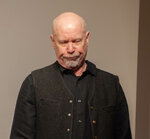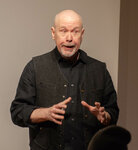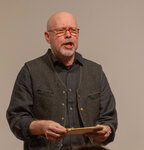As someone who often writes about live theatre, it is not uncommon for me to take copious notes during the performance and then refer to them later on when I sit down to put pen to paper—as it …
Stay informed about your community and support local independent journalism.
Subscribe to The River Reporter today. click here
This item is available in full to subscribers.
Please log in to continue |




As someone who often writes about live theatre, it is not uncommon for me to take copious notes during the performance and then refer to them later on when I sit down to put pen to paper—as it were.
Then there are times when I just want to sit back and enjoy the show, or simply experience it on its own terms, without constantly distracting myself, much less others in attendance. I do my best to be unobtrusive (especially when planning to snap a photo or two). I sit in the back row and always, always warn, prepare and otherwise beg the indulgence of anyone seated near me.
Such was the case last weekend when I settled in with That Dog Named Gidget at the Delaware Valley Arts Alliance (DVAA) for Richard Hoehler’s one-man show, simply titled “E.”
The dog is still in training, and these days I’m prepared to make a hasty exit if necessary, but she was on her best behavior; my neighbors seated nearby were extremely gracious; and as the lights dimmed, a hush fell over the packed house.
As described in the program, the show “offers a poignant exploration of the remarkable friendship between Hoehler and the much older Edith Spezialli.” That it does, but it is much, much more.
“E” is many things. It’s a memory piece and a tribute to the indomitable force of nature that Speziali clearly was, and with Hoehler at the helm of this production, it doesn’t really feel like she has “left the building” at all. As he describes their relationship to the audience, it’s easy to think that she might be just around the corner, taking a drag on a cigarette, poised to entertain us with her special brand of humor and wit. Hoehler has brought it to life through this smart, sweet, touching and often hilarious memoir.
A glance at my notes serves to remind me that both he and she are eminently quotable, ( E: “Do you want love, or do you want to own real estate?”) and as the story of their friendship unfolds, it becomes clear that Edith not only served as Hoehler’s muse, but that she also had a direct influence on his life.
“It’s not just about her,” I scribbled in my notebook, “and it’s not just about him—it’s about them. Two people’s stories, individually and inextricably intertwined for decades—a symbiotic relationship. It’s as if they needed each other to feel complete.”
The notes also served to remind me that Hoehler is adept at holding an audience rapt. He recounts their story with a great range of emotion that not only plays across his face but changes his physicality. He interjects anecdotes with her voice, her mannerisms and her joie de vivre, often volleying back and forth conversationally between “he” and “she” with lightning speed.
At times, Hoehler was so soft-spoken that I had to lean into the conversation and my notes indicate that “you could hear a pin drop”—but that also made it difficult at times, sometimes uncomfortable to take in. It could be intentional (IMHO) since there were times when the story took a dark turn, exploring the playwright’s battle with alcoholism, his dysfunctional family dynamic and his hidden demons, which she could clearly see.
When talking with Edith about a road trip that they had taken, Hoehler described their stay as “in a cheap motel that looked like a box of Ritz crackers laying on its side.”
“Richard, write that down,” Edith advised repeatedly over the years, encouraging his talent. She was also bluntly honest at times and he credits her with not-so-gently guiding him toward sobriety at a crucial point in his life. “You used to look like a young poet,” she once said, “and now you look like an old drunk.”
Seeing his life through her eyes, often laced with the unvarnished truth, “E” is as much a story about his journey as it is hers. Over the course of 10 years or so, Hoehler has honed this piece, working out the kinks in front of an audience, gauging what works, what doesn’t, and what makes sense. I’m confident that I’m not alone in thinking that in doing so, he has given all of us a gift.
“While not actually famous,” I scribbled during the show, “she knew a lot of famous people and was celebrated in her own right, and Hoehler is keeping her spirit alive in vivid detail. She comes across like Auntie Mame on steroids.”
Hoehler shares his/her/their story with great ease, love, respect and admiration and (according to my notes) “E” is a tribute to a life well lived. Although we never met, I feel like I knew Edith Speziali, and am a better person for it. Thankfully, Richard Hoehler was listening when she took one last drag on her cigarette, looked him squarely in the eye and said. “Write that down, Richard. Write that down.”
To learn more about the playwright, visit www.richardhoehler.com. For more about programming at the DVAA, go to www.delawarevalleyartsalliance.org.
Comments
No comments on this item Please log in to comment by clicking here